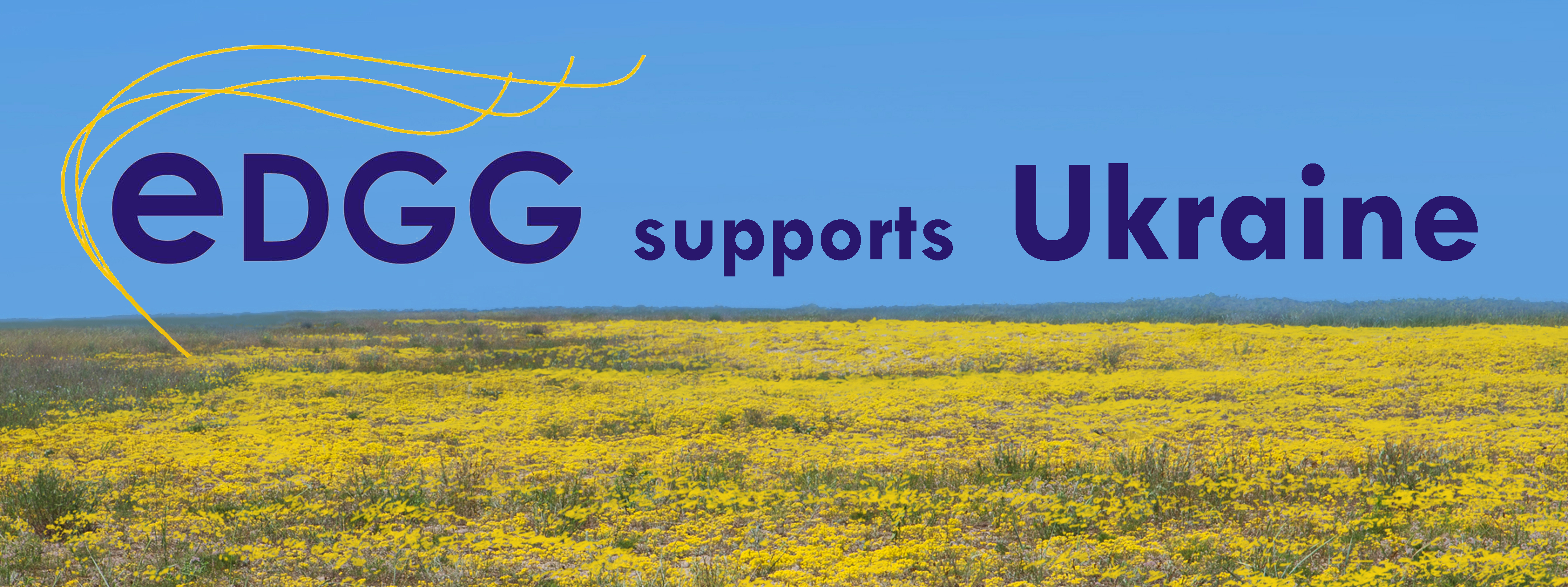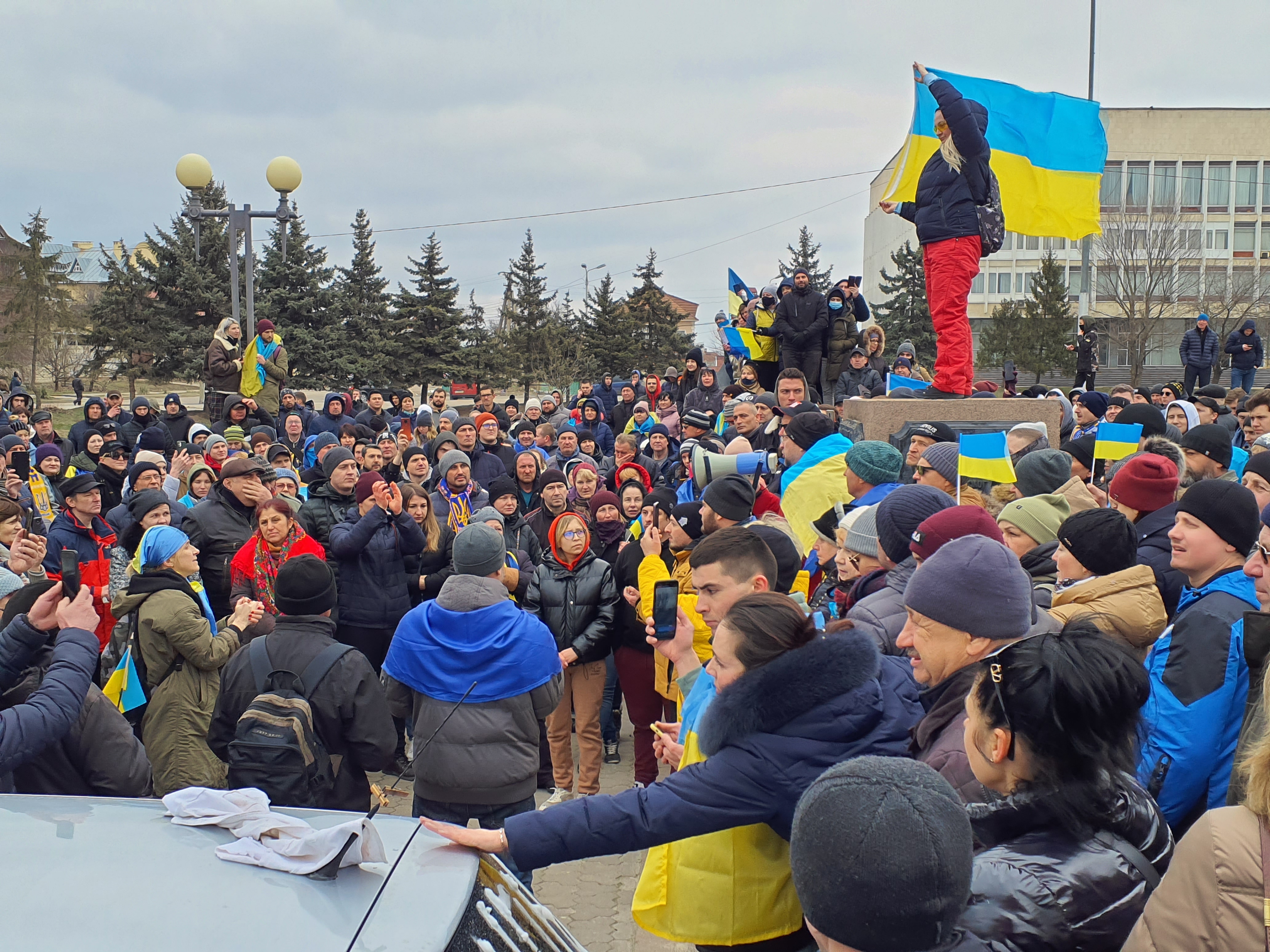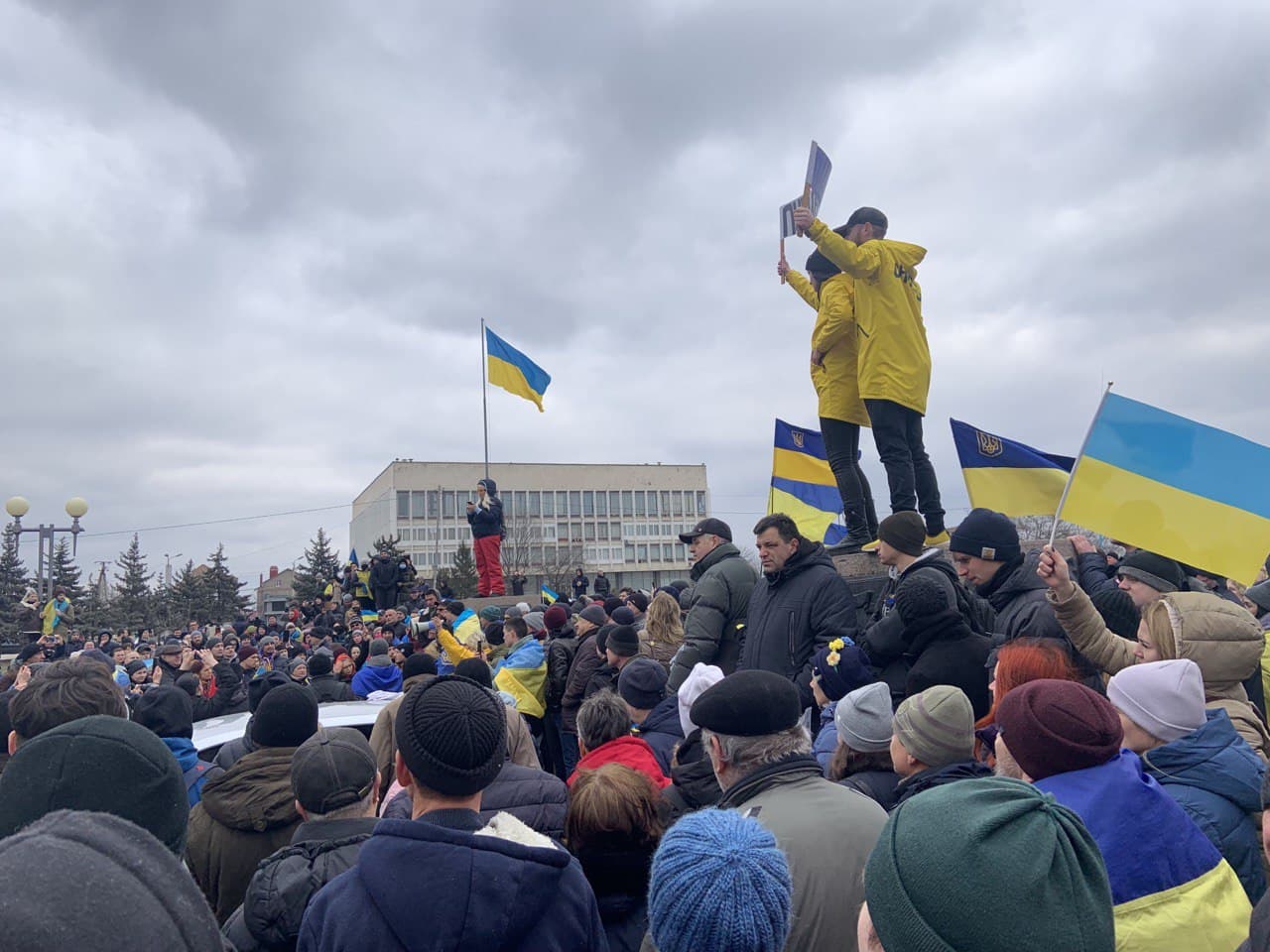
Sand dune communities near Pokrovka village, Ukraine. Photo: J. Dengler. Digital art: R. Labadessa.
The EDGG is an organization based on scientific exchange across cultural barriers, as a community of researchers brought together by mutual interest in research on, and conservation of, grasslands. Our events are also characterised by cultural interaction. The recent invasion of Ukraine by Russian military forces, and the devastating bombardment of Ukrainian towns and cities has been a huge shock for most of us. According to our information, the territories studied during the 15th Field Workshop have largely been seized by the Russian military.
We want to express our absolute condemnation of this violence, and the pain and suffering that is being
caused to the people of Ukraine. The EDGG has deep connections with Ukraine. We have a large number of Ukrainian members, and we conducted two Field Workshops (2010 and 2021), as well as the Eurasian Grassland Conference (2011) in Uman. We would like to express our support and compassion for our fellow EDGG Chair, Anna Kuzemko, who right now is enduring the Russian aggression in Kyiv, and also with all our other friends and colleagues in Kherson, Odessa, Lviv and other Ukrainian cities and regions. We are deeply concerned about their safety.
As scientists, we know that good science can only exist in free countries. This said, we take relief in the fact that in this dark moment in European history, many Russian scientists have been brave enough to raise their voice against the barbarity of their political leaders (https://trv-science.ru/2022/02/we-are-against-war/). We have little possibility of providing concrete support to help Ukraine defend itself against this invasion, but we encourage our members to support the numerous charities that are collecting funds to help humanitarian causes and offering a safe place to students and scientists. For the ones who would like to communicate on this matter, you can join the email list edgg-supports-ukraine. You can also follow EDGG accounts on Twitter @GrasslandE and Facebook Group which we use actively on this matter.
We open the EDGG Fund for supporting Ukrainian Scientists: we call for donations, small or large, to our parent organisation IAVS, who will spend the money only upon receipt of a request from the EDGG Executive Committee.
EDGG Fund for Ukrainian Scientists: call for financial donations
The IAVS Council approved a series of actions to support our colleagues in Ukraine. One of these actions was to create a special IAVS fund to support research by IAVS members remaining in Ukraine, with special emphasis on research on ecosystems affected by the war. This fund is now open for applications at UkrainianMembersResearchFund
Below we provide further useful information to support the Ukrainian people. We encourage our members to support the numerous charities that are collecting funds to help humanitarian causes and offering a safe place to students and scientists. We will do our best to update the information regularly.
#StandWithUkraine
Humanitarian assistance
Support for Ukrainian children
Beneficiary: BILOSHAPKA ANNA 08173, Ukraine, region Kyivska, district Kyievo-Sviatoshynskyi, village Khodosivka, street Mykoly Hoholia, building 7
Account: 5169360006600104
Bank of Beneficiary: JSC CB PRIVATBANK, 1D HRUSHEVSKOHO STR., KYIV, 01001, UKRAINE
SWIFT code/BIC: PBANUA2X
Correspondent account: 0011000080
Intermediary bank: JP MORGAN CHASE BANK
SWIFT code/BIC: CHASUS33f
Support for the Ukrainian Army
Easy way to transfer money to the National Bank of Ukraine to Support the Ukrainian Army: https://bank.gov.ua/en/news/all/natsionalniy-bank-vidkriv-spetsrahunok-dlya-zboru-koshtiv-na-potrebi-armiyi?fbclid=IwAR1FWhKktmjNIzZ-V5yQFS6KTpW9UbPZZ1ObPYziB6oaHLznCYY6PWe2Kpo
Other ways to transfer money for the Ukrainian army via the National Bank of Ukraine:
For funds in USD:
SWIFT Code NBU: NBUA UA UX
JP MORGAN CHASE BANK, New York
SWIFT Code: CHASUS33
Account: 400807238
383 Madison Avenue, New York, NY 10179, USA
Payment to account
UA843000010000000047330992708
For funds in GBP:
SWIFT Code NBU: NBUA UA UX
Bank of England, London
SWIFT Code: BKENGB2L
Account: 40000982
Threadneedle Street, London EC2R 8AH, UK
Payment to account
UA843000010000000047330992708
For funds in EUR:
SWIFT Code NBU: NBUA UA UX
DEUTSCHE BUNDESBANK, Frankfurt
SWIFT Code: MARKDEFF
Account: 5040040066
IBAN DE05504000005040040066
Wilhelm-Epsteinn-Strabe 14, 60431 Frankfurt Am Main, Germany
Payment to account UA843000010000000047330992708
Support for Ukrainian nature: Contribution to the Ukrainian Nature Conservation Group: https://uncg.org.ua/nashi-rakhunky-dlia-blahodijnykh-vneskiv-u-inozemnij-valiuti-our-accounts-for-charitable-contributions-in-euro-usd/
Support for Ukraine via Lithuania and Baltic States: https://www.blue-yellow.lt/en/
Student positions
Czech Republic:
- Masaryik University (Brno). Plan for having free over 400 positions for Ukrainian students that wish to continue their studies in Czech Republic (either step in or from distance) via a simplified version of admission. The interested ones may visit the website and/or contact the Uni: https://www.muni.cz/en
Estonia:
- Information on support for Ukrainian students and academic staff: https://ut.ee/en/ukraine
Finland:
- University of East Finland has 20 places for Ukrainian students. Application period: 7.3.2022–21.3.2022. You can contact Tapio Määttä, academic rector (akateeminen rehtori), University of East Finland (Itä-Suomen yliopisto) tapio....@uef.fi, phone: 050 575 1589. Studies can start April 1, 2022 with right to study up until July 31, 2023. Study can take place at Joensuu or Kuopio campuses. More information for applicants: admis...@uef.fi. After that, students can apply for further right to study at the university in a degree programme as part of the regular admissions procedure.
- Application for separate studies for citizens of Ukraine 2022: https://link.webropolsurveys.com/S/678C6BF547CD8508
- Special stipend positions (in Finnish): https://www.uef.fi/fi/artikkeli/ita-suomen-yliopisto-tarjoaa-20-ukrainalaiselle-opiskelupaikan
- University of Helinski information on War on Ukraine: https://www.helsinki.fi/en/news/war-ukraine?utm_source=twitter&utm_medium=social_owned. Extracted from this website:
"University of Helsinki grants the right to complete non-degree studies to persons who have arrived in Finland and whose degree studies have been suspended at the Ukrainian higher education institution due to war.
The right of completion may be granted to courses or study modules on the basis of a free-form application. The application must indicate the language skills of the applicant, the discipline and the extent of studies completed in the past, and other grounds for the application. A copy of the passport or similar document shall be attached to the application.
Applications will be processed until the end of 2022 without application deadlines. Rights of completion will be granted until 31.7.2023 and no fees will be charged for non-degree studies."
Ukrainian citizens will not be charged for studies at Open University until autumn 2023."
Support for accomodation in Europe:
- Magdalena Firganek (mbfirganek@gmail.com) and Cath Williams (Cath.Williams@environment-agenciy.gov.uk) for accomodation in Poland and UK.
- Arek Nowak (anowak@uni.opole.pl) for accomodation in Poland.
- Jürgen Dengler (dr.juergen.dengle@gmail.com) for accomodation in Switzerland.
- Anikó Csecerits (csecserits.aniko@okologia.mta.hu) for accomodation in Hungary.
Austria
- Austrian Academy of Sciences started an emergency fund that allows Ukrainian scientists to be temporarily hosted at an Austrian research institution. https://stipendien.oeaw.ac.at/stipendien/jesh-ukraine
Denmark
-
Aarhus University Ukrainian fellowships for reseachers: https://aias.au.dk/opportunities-at-aias/auff-ukraine-fellowships
Estonia
- Support for Ukrainian students and academic staff: https://ut.ee/en/ukraine
Finland
- Finnish Environment Institute (SYKE) offers a 2-year placement for a Ukrainian doctoral or postdoctoral researcher conducting research that promotes #SustainabilityTransformation. Contact Research Director Eeva Primmer (Twitter: @EevaPrimmer) for more information. See also Twitter hashtag #ScienceForUkraine
Germany
- University of Regensburg. Department of Ecology and Conservation Biology, ready to host two Ukrainian scientists doing research in plant Sciences. Funding is possible via @AvHStiftung with the deadline on 18.03.2022. Dr. Sergey Rosbakh, Ecology and Conservation Biology, Institute of Plant Sciences, Faculty of Biology and Preclinical Medicine, University of Regensburg, D-93040 Regensburg Germany. E-mail: sergey....@ur.de. Sergey Rosbakh is ready to help. Send him a DM for further info. He speaks Russian and can/will help with the application, too.
- Anke Jetsch, from the University of Bayreuth, invites Ukrainian researchers to join ther team of vegetation ecologists. Here below the three German funding opportunities for refugee researchers from Ukraine. She is ready to assist with the application (as well as with finding accomodation, school for kids, etc.
- Allexander von Humboldt Foundation, Philipp Schwartz Initiative. In view of the crisis in the Ukraine, the Alexander von Humboldt Foundation is extending the deadline for universities and research institutions in Germany to submit applications for Ukrainian scholars under immediate threat in the current selection round of the Philipp Schwartz Initiative. For more information see this PDF (as of Feb 25, 2022). The university supports hosts and researchers with their nomination. Potential candidates cannot themselves apply for participation. The extended deadline for nominations is March 18, 2022.
- DAAD: Hilde Domin Programme. The German Academic Exchange Service (DAAD) administers the scholarship programme “Hilde Domin Programme” with funds from the Federal Foreign Office (AA). The programme serves to support students and doctoral candidates from across the globe, who are at risk of being formally or de facto denied educational or other rights in their country of origin, and to provide these students and doctoral candidates with an opportunity to begin or complete a study or research degree at a higher education institution in Germany. The university supports hosts and researchers with their nomination which is possible at anytime. Potential candidates cannot themselves apply for participation. For more information see the DAAD website.
- DFG: Refugee Researchers. The Deutsche Forschungsgemeinschaft (DFG, German Research Foundation) supports researchers who have fled their home countries by making it easier for them to join research projects and apply for funding under the Walter Benjamin Programme. All project leaders and also higher education institutions can submit supplemental proposals to integrate qualified refugees - prospective or doctoral researchers – in DFG projects that already receive funding. These proposals can be justified based on the fact that individuals are now available for the further development of a project whose involvement can be expected to provide additional stimuli for the research programme in question. In addition, project leaders may use funds that have already been approved; options are guest funds, staff positions and the Mercator module. The university supports PIs with their application which is possible at any time. For more information see the DFG website.
- The Jena Experiment. The Jena Experiment (http://the-jena-experiment.de/) supports scientists from the Ukraine. We offer support for research applications through funding agencies like the German Research Foundation (DFG) and the Alexander-von-Humboldt Foundation. The Jena Experiment studies biodiversity effects on ecosystem functioning in grassland. We offer working on unprecedented long-term (synthesis) datasets; for example plant biomass data from the Trait-Based Experiment or plant phenology data in the Main Experiment. We are open for additional ideas. Contact: jenaexperiment@uni-jena.de.
Latvia
- Job offers from Latvia: https://scienceforukraine.eu/
Poland
- University of Opole, possibility of temporal employment for botanists. Address to Arek Nowak
- Powsing Botanical Garden (Warsaw), employment for 2-3 gardeners. Address to Arek Nowak
- Polish Academy of Sciences: within the framework of cooperation with the National Academy of Sciences of Ukraine (NASU) we introduce a new tool supporting cooperation with the Ukrainian researchers.
General conditions: a) expenses related to travel and stay of the Ukrainian scientists in the units of the PAS will be covered by the PAS; b) duration of the stay in the units of the PAS up to 3 months with possibility of extension, if necessary.
Who can apply: To apply for funding the units of the PAS submit an application (enclosed) to the International Relation Department of the PAS. The call is ongoing until further notice. The Ukrainian researchers who do not have scientific partners in the units of the PAS may contact: International Relations Office of the PAS at (b...@pan.pl) or the acting director of the PAS representation center in Kiyv: Mateusz Białas ( Mateusz...@pan.pl).
Financial conditions: a) living expenses - 5000 PLN monthly, b) travel costs from Ukraine to Poland - up to 1500 PLN. The refunding of costs will be carried out to the units of the PAS on a monthly basis. Contact at PAN: b...@pan.pl.
Further information: https://informacje.pan.pl/informacje/materialy-dla-prasy/3534-pobyty-naukowcow-z-ukrainy-w-pan for the action, in PL and UA, with FAQs (in PL) about this action. From the most important news - this concerns ALL Ukrainian scientists, not only those from NANU (i.e. from universities also).
Switzerland
- ETH Zürich: Agricultural Economics and Policy Group (AECP Group). If you are a postdoc or PhD student at an Ukrainian university focusing on agricultural economics/policy, we at AECP Group @ETH_en @aecp_eth can temporarily host & support you. Get in touch!
- ETH Zürich: World Food System Center (WFSC) offers: @ethzWFSC
- For any information related to Swiss Universities, and particularly ZHAW in Zurich, please address to Jürgen Dengler, dr.juergen.dengler@gmail.com.
EDGG activities in Ukraine
2011: 8th European Dry Grassland Meeting: Dry grassland of Europe: biodiversity, classification, conservation and management. 13-17 June 2011, Uman', Ukraine
A total of 80 participants from 18 countries attended. Twenty talks and 33 posters were presented.
Organizers: EDGG, National Dendrological Park ‘Sofiyiv-ka’ of the NAS of Ukraine, M.G. Kholodny Institute of Botany of the NAS of Ukraine
Supporters: International Association for Vegetation Science (IAVS), Floristisch-Soziologische Arbeitsgemeinschaft (FlorSoz), O.V. Fomin Botanical Garden of the Taras Shevchenko Kiev National University, Kherson State University, Biosphere Reserve ‘Askania-Nova’, National Nature Park ‘Buz’ky Gard’
Local organizing committee:
- Anna A. Kuzemko, National Dendrological Park "Sofiyvka" NAS of Ukraine
- Sergei L. Mosyakin, M.G. Kholodny Institute of Botany NAS of Ukraine
- Alexander E. Khodosovtsev, Kherson State University
Publications: Book of abstracts, conference report, special feature in Tuexenia 32 (2012)
EDGG publications from Ukraine
Budzhak, V., Chorney, I., Tokariuk, A. & Kuzemko, A. 2021. Photo Story: “Sinozhati” – the sacred place of Pokuttya (Western Ukraine) as a center of meadow-steppe diversity preservation. Palaearctic Grasslands 50: 18-26. [pdf]
Kovtoniuk, A. 2020. Spontaneous grassland vegetation of the garden and park landscapes of Middle Pobuzhzhia (Central Ukraine). Palaeartic grasslands 45: 25-33. [pdf]
Kuzemko, A.; Bezrodnova, O.; Savchenko, G.; Ronkin, V.; Valiuk, V.; Tsymbaliuk, V. 2018. Syntaxonomy and scale-dependent species diversity of plant communities on chalk outcrops in the Kharkiv region (Ukraine). Palaeartic grasslands 37: 14-25.[pdf]
Kuzemko, A., Vasyliuk, O., Marushchak, O. & Kolomytsev, G. 2020. 730,000 hectares of grasslands are included in the Emerald Network of Ukraine. Palaeartic grasslands 45: 89-93. [pdf]
Moysiyenko,KI.,I., Sudnik-Wójcikowska, B. (2010): Kurgans of Ukraine as a refuge of steppe flora. – Bull. Eur. Dry Grassl. Group 6: 9–13, Hamburg. [pdf]
Moysiyenko, I., Vynokurov, D., Shyriaieva, D., Skobel, D., Babitskyi, A., Bednarska, I., Bezsmertna, O., Chusova, O., Dengler, J., Guarino, G., Kalashnik, K., Khodosovtsev, A., Kolomiychuk, V., Kucher, O., Kuzemko, K., Shapoval, V., Umanets, O., Zagorodniuk, N., Zakharova, M. & Dembicz, I. 2022. Grasslands and coastal habitats of Southern Ukraine: First results from the 15th EDGG Field Workshop. Palaearctic Grasslands 52: 44-83. [pdf]
Peregrym, M., Pénzesné Kónya, E., Vasyliuk, O. 2018. The impact of artificial light at night (ALAN) on the National Nature Parks, Biosphere and Naturе Reserves of the Steppe Zone and Crimean Mountains within Ukraine. Palaeartic grasslands 39: 8-14. [pdf]
Tokarsky, V. & Tokarskaya, N. 2017. Review of current state, threats and necessity of conservation of the original flora and fauna of East Ukraine steppes. EDGG Bulletin 34: 32-37. [pdf]
Vasyliuk, O. 2017. Chronicles of the protection of Tarutyns’kyj Steppe. EDGG Bulletin 34: 38-41. [pdf]
Vasyliuk, O., Kolomytsev, G. & Sapsai, T. 2019. Fire in the protected areas of Eastern Ukraine. Palaeartic grasslands 41: 26-30. [pdf]
Vasyliuk , O., Shyriaieva, D., Kolomytsev, G. & Spinova, J. 2017. Steppe protected areas on the territory of Ukraine in the context of the armed conflict in the Donbas region and Russian annexation of the Crimean Peninsula. EDGG Bulletin 33: 15-23.[pdf]
Vynokurov, D., Moysiyenko, I., Shyriaieva, D., Khodosovtsev, A., Dembicz, I. & Biurrun, I. 2019. 14th EDGG Field Workshop: Ukrainian steppes along climatic gradients Ukraine, 25 May – 3 June 2020, Second Call. Palaeartic grasslands 44: 6-15. [pdf]
Vynokurov, D., Moysiyenko, I., Shyriaieva, D. Dembicz, I. & Biurrun, I. 2019. 14th EDGG Field Workshop: Ukrainian steppes along climatic gradients. Ukraine, First call. Palaeartic grasslands 43: 6-7. [pdf]


People protesting in occupied Kherson, 5 March 2022. Photo: I. Moysiyenko.


The buildings of the Kharkiv National University, destroyed by the bombing of Russian aircraft. Photo from Ukrainian media.
Dry grasslands before the war in Kharkiv and Kherson regions. Photos: A. Kuzemko & I. Moysienko.
